ECON 401: Japan's Economic Growth Under Globalization: An Analysis
VerifiedAdded on 2022/12/26
|8
|1374
|77
Report
AI Summary
This report analyzes the multifaceted impact of globalization on the Japanese economy. It begins with an introduction highlighting the benefits such as migrant labor, outsourcing, technological advancements, and increased government revenue through taxation, while acknowledging the negative consequences like rising unemployment among native populations and the imposition of tariffs. The report then presents a table of macroeconomic indicators, including GDP per capita, inflation, income inequality, unemployment, and exchange rates, illustrating the effects of globalization on each. It further details the advantages of globalization, such as increased trade and access to raw materials, and the disadvantages, including wage pressure on low-skilled workers and rising income inequality. The report references the decline of the Japanese population and government's attempts to outsource external labor. It mentions Japan's membership in international trade organizations and the benefits derived from these partnerships. Finally, the report concludes that, despite the challenges, globalization remains a necessity for Japan, particularly in light of recent protectionist measures and trade wars. The report uses multiple sources to support the arguments.

ECONOMICS
Student’s Name
Course
Professor’s Name
University
(City) State
Date
Student’s Name
Course
Professor’s Name
University
(City) State
Date
Paraphrase This Document
Need a fresh take? Get an instant paraphrase of this document with our AI Paraphraser
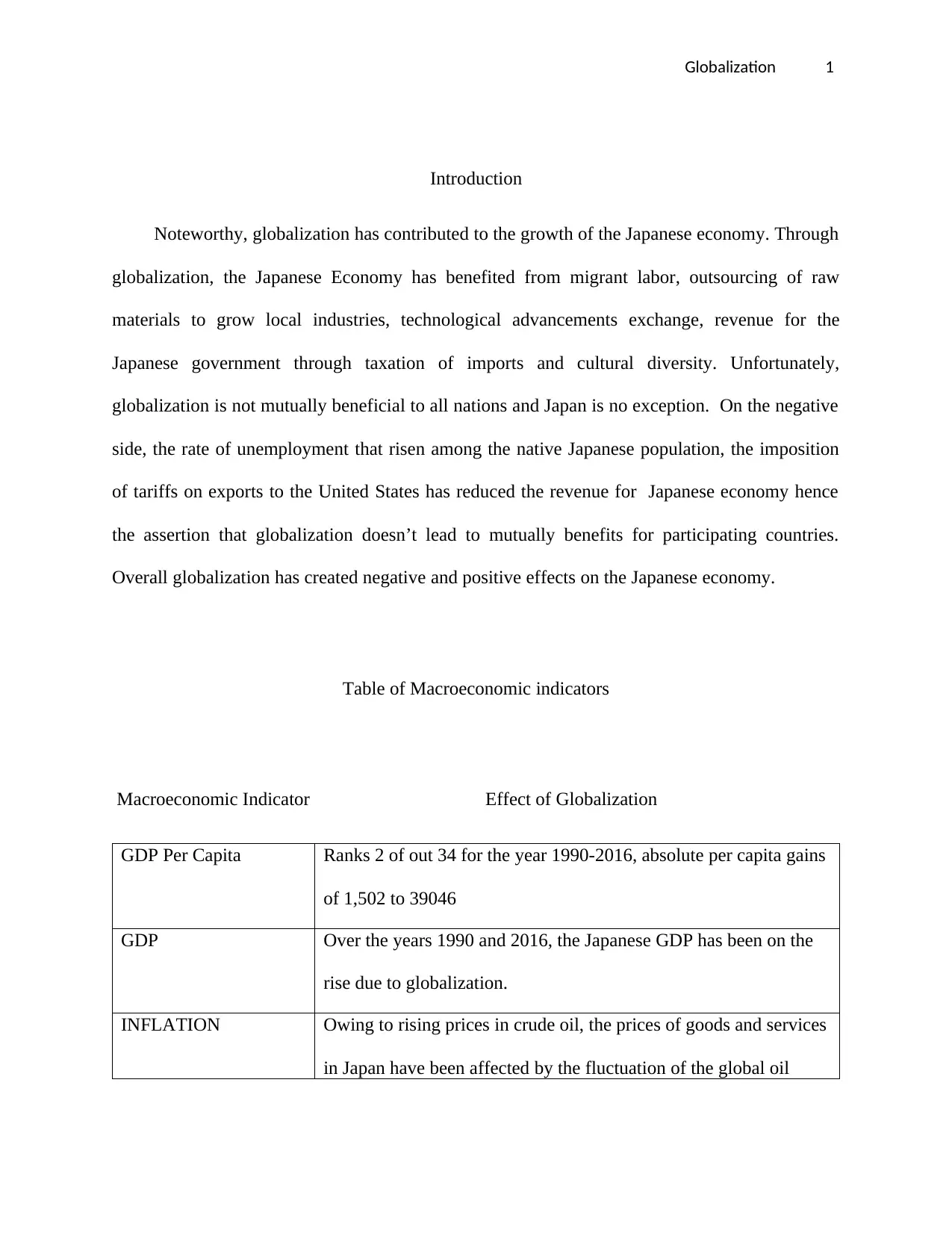
Globalization 1
Introduction
Noteworthy, globalization has contributed to the growth of the Japanese economy. Through
globalization, the Japanese Economy has benefited from migrant labor, outsourcing of raw
materials to grow local industries, technological advancements exchange, revenue for the
Japanese government through taxation of imports and cultural diversity. Unfortunately,
globalization is not mutually beneficial to all nations and Japan is no exception. On the negative
side, the rate of unemployment that risen among the native Japanese population, the imposition
of tariffs on exports to the United States has reduced the revenue for Japanese economy hence
the assertion that globalization doesn’t lead to mutually benefits for participating countries.
Overall globalization has created negative and positive effects on the Japanese economy.
Table of Macroeconomic indicators
Macroeconomic Indicator Effect of Globalization
GDP Per Capita Ranks 2 of out 34 for the year 1990-2016, absolute per capita gains
of 1,502 to 39046
GDP Over the years 1990 and 2016, the Japanese GDP has been on the
rise due to globalization.
INFLATION Owing to rising prices in crude oil, the prices of goods and services
in Japan have been affected by the fluctuation of the global oil
Introduction
Noteworthy, globalization has contributed to the growth of the Japanese economy. Through
globalization, the Japanese Economy has benefited from migrant labor, outsourcing of raw
materials to grow local industries, technological advancements exchange, revenue for the
Japanese government through taxation of imports and cultural diversity. Unfortunately,
globalization is not mutually beneficial to all nations and Japan is no exception. On the negative
side, the rate of unemployment that risen among the native Japanese population, the imposition
of tariffs on exports to the United States has reduced the revenue for Japanese economy hence
the assertion that globalization doesn’t lead to mutually benefits for participating countries.
Overall globalization has created negative and positive effects on the Japanese economy.
Table of Macroeconomic indicators
Macroeconomic Indicator Effect of Globalization
GDP Per Capita Ranks 2 of out 34 for the year 1990-2016, absolute per capita gains
of 1,502 to 39046
GDP Over the years 1990 and 2016, the Japanese GDP has been on the
rise due to globalization.
INFLATION Owing to rising prices in crude oil, the prices of goods and services
in Japan have been affected by the fluctuation of the global oil
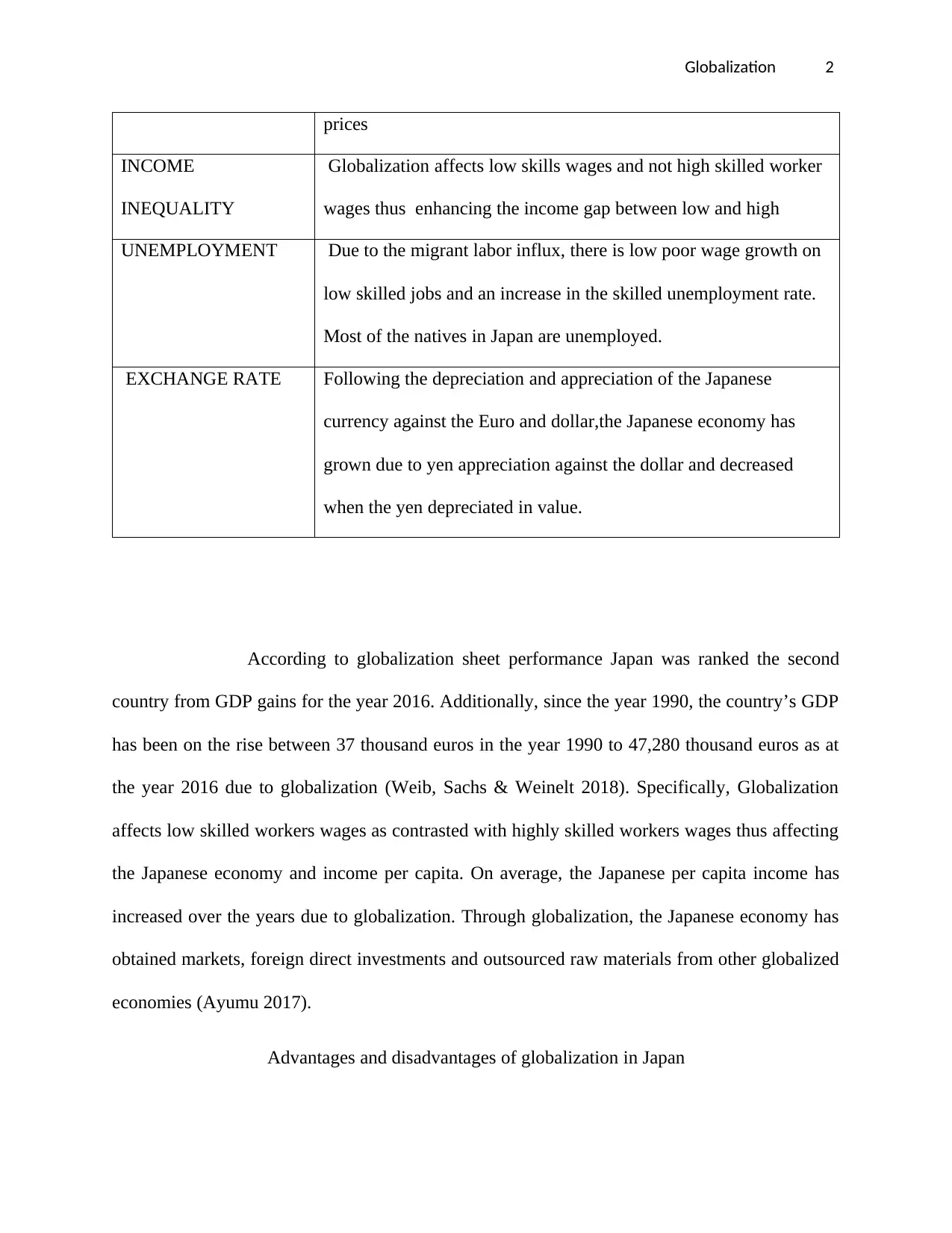
Globalization 2
prices
INCOME
INEQUALITY
Globalization affects low skills wages and not high skilled worker
wages thus enhancing the income gap between low and high
UNEMPLOYMENT Due to the migrant labor influx, there is low poor wage growth on
low skilled jobs and an increase in the skilled unemployment rate.
Most of the natives in Japan are unemployed.
EXCHANGE RATE Following the depreciation and appreciation of the Japanese
currency against the Euro and dollar,the Japanese economy has
grown due to yen appreciation against the dollar and decreased
when the yen depreciated in value.
According to globalization sheet performance Japan was ranked the second
country from GDP gains for the year 2016. Additionally, since the year 1990, the country’s GDP
has been on the rise between 37 thousand euros in the year 1990 to 47,280 thousand euros as at
the year 2016 due to globalization (Weib, Sachs & Weinelt 2018). Specifically, Globalization
affects low skilled workers wages as contrasted with highly skilled workers wages thus affecting
the Japanese economy and income per capita. On average, the Japanese per capita income has
increased over the years due to globalization. Through globalization, the Japanese economy has
obtained markets, foreign direct investments and outsourced raw materials from other globalized
economies (Ayumu 2017).
Advantages and disadvantages of globalization in Japan
prices
INCOME
INEQUALITY
Globalization affects low skills wages and not high skilled worker
wages thus enhancing the income gap between low and high
UNEMPLOYMENT Due to the migrant labor influx, there is low poor wage growth on
low skilled jobs and an increase in the skilled unemployment rate.
Most of the natives in Japan are unemployed.
EXCHANGE RATE Following the depreciation and appreciation of the Japanese
currency against the Euro and dollar,the Japanese economy has
grown due to yen appreciation against the dollar and decreased
when the yen depreciated in value.
According to globalization sheet performance Japan was ranked the second
country from GDP gains for the year 2016. Additionally, since the year 1990, the country’s GDP
has been on the rise between 37 thousand euros in the year 1990 to 47,280 thousand euros as at
the year 2016 due to globalization (Weib, Sachs & Weinelt 2018). Specifically, Globalization
affects low skilled workers wages as contrasted with highly skilled workers wages thus affecting
the Japanese economy and income per capita. On average, the Japanese per capita income has
increased over the years due to globalization. Through globalization, the Japanese economy has
obtained markets, foreign direct investments and outsourced raw materials from other globalized
economies (Ayumu 2017).
Advantages and disadvantages of globalization in Japan
⊘ This is a preview!⊘
Do you want full access?
Subscribe today to unlock all pages.

Trusted by 1+ million students worldwide
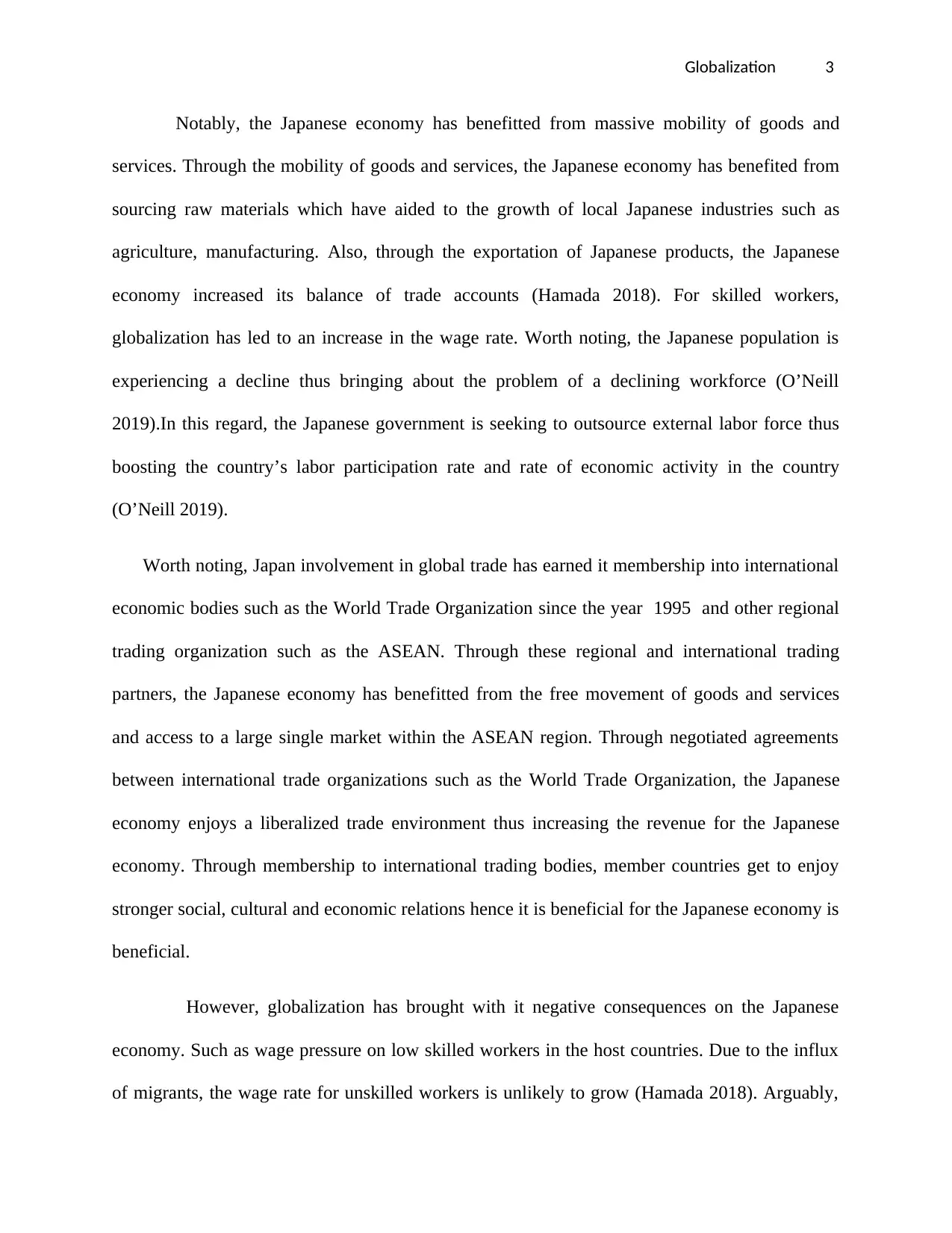
Globalization 3
Notably, the Japanese economy has benefitted from massive mobility of goods and
services. Through the mobility of goods and services, the Japanese economy has benefited from
sourcing raw materials which have aided to the growth of local Japanese industries such as
agriculture, manufacturing. Also, through the exportation of Japanese products, the Japanese
economy increased its balance of trade accounts (Hamada 2018). For skilled workers,
globalization has led to an increase in the wage rate. Worth noting, the Japanese population is
experiencing a decline thus bringing about the problem of a declining workforce (O’Neill
2019).In this regard, the Japanese government is seeking to outsource external labor force thus
boosting the country’s labor participation rate and rate of economic activity in the country
(O’Neill 2019).
Worth noting, Japan involvement in global trade has earned it membership into international
economic bodies such as the World Trade Organization since the year 1995 and other regional
trading organization such as the ASEAN. Through these regional and international trading
partners, the Japanese economy has benefitted from the free movement of goods and services
and access to a large single market within the ASEAN region. Through negotiated agreements
between international trade organizations such as the World Trade Organization, the Japanese
economy enjoys a liberalized trade environment thus increasing the revenue for the Japanese
economy. Through membership to international trading bodies, member countries get to enjoy
stronger social, cultural and economic relations hence it is beneficial for the Japanese economy is
beneficial.
However, globalization has brought with it negative consequences on the Japanese
economy. Such as wage pressure on low skilled workers in the host countries. Due to the influx
of migrants, the wage rate for unskilled workers is unlikely to grow (Hamada 2018). Arguably,
Notably, the Japanese economy has benefitted from massive mobility of goods and
services. Through the mobility of goods and services, the Japanese economy has benefited from
sourcing raw materials which have aided to the growth of local Japanese industries such as
agriculture, manufacturing. Also, through the exportation of Japanese products, the Japanese
economy increased its balance of trade accounts (Hamada 2018). For skilled workers,
globalization has led to an increase in the wage rate. Worth noting, the Japanese population is
experiencing a decline thus bringing about the problem of a declining workforce (O’Neill
2019).In this regard, the Japanese government is seeking to outsource external labor force thus
boosting the country’s labor participation rate and rate of economic activity in the country
(O’Neill 2019).
Worth noting, Japan involvement in global trade has earned it membership into international
economic bodies such as the World Trade Organization since the year 1995 and other regional
trading organization such as the ASEAN. Through these regional and international trading
partners, the Japanese economy has benefitted from the free movement of goods and services
and access to a large single market within the ASEAN region. Through negotiated agreements
between international trade organizations such as the World Trade Organization, the Japanese
economy enjoys a liberalized trade environment thus increasing the revenue for the Japanese
economy. Through membership to international trading bodies, member countries get to enjoy
stronger social, cultural and economic relations hence it is beneficial for the Japanese economy is
beneficial.
However, globalization has brought with it negative consequences on the Japanese
economy. Such as wage pressure on low skilled workers in the host countries. Due to the influx
of migrants, the wage rate for unskilled workers is unlikely to grow (Hamada 2018). Arguably,
Paraphrase This Document
Need a fresh take? Get an instant paraphrase of this document with our AI Paraphraser
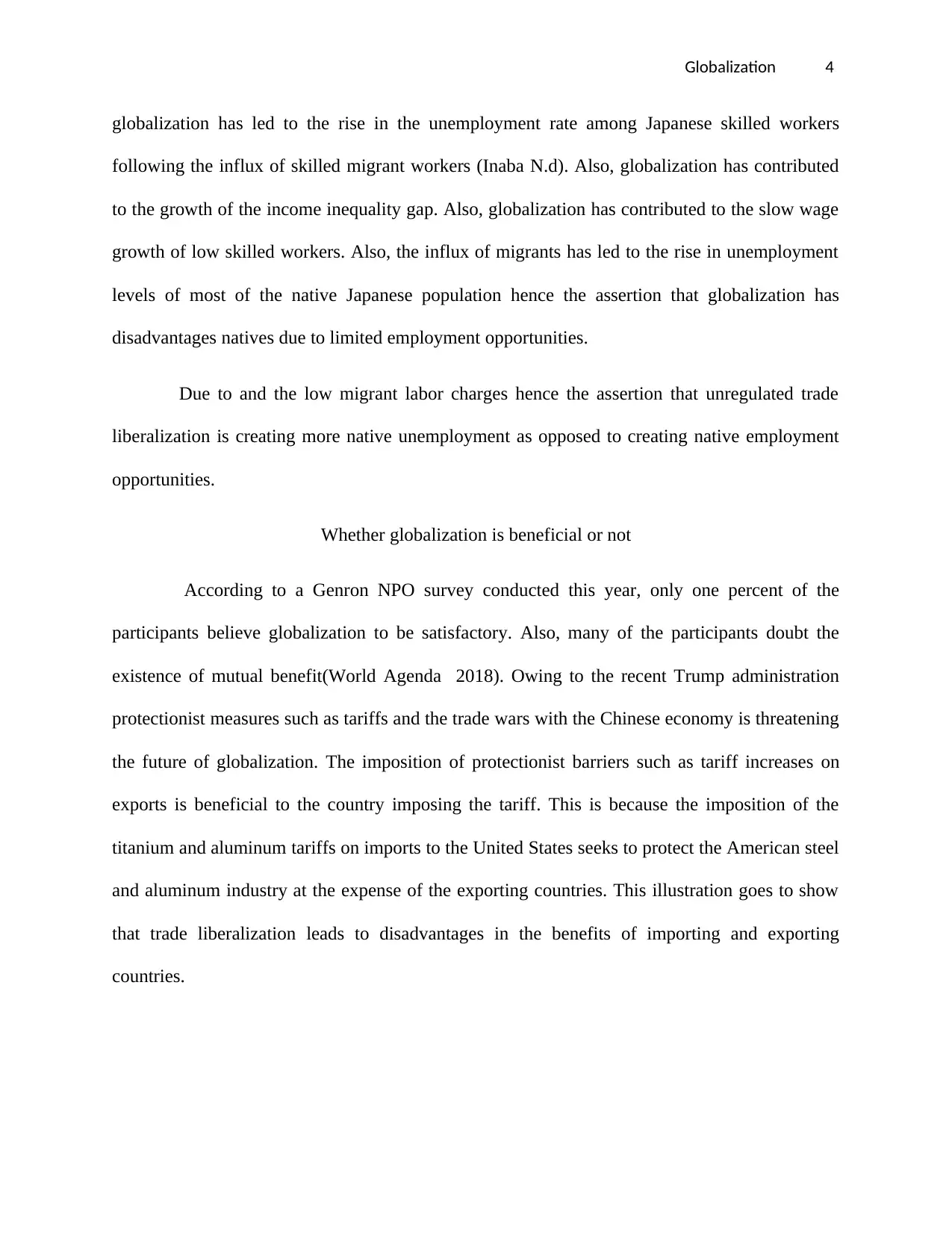
Globalization 4
globalization has led to the rise in the unemployment rate among Japanese skilled workers
following the influx of skilled migrant workers (Inaba N.d). Also, globalization has contributed
to the growth of the income inequality gap. Also, globalization has contributed to the slow wage
growth of low skilled workers. Also, the influx of migrants has led to the rise in unemployment
levels of most of the native Japanese population hence the assertion that globalization has
disadvantages natives due to limited employment opportunities.
Due to and the low migrant labor charges hence the assertion that unregulated trade
liberalization is creating more native unemployment as opposed to creating native employment
opportunities.
Whether globalization is beneficial or not
According to a Genron NPO survey conducted this year, only one percent of the
participants believe globalization to be satisfactory. Also, many of the participants doubt the
existence of mutual benefit(World Agenda 2018). Owing to the recent Trump administration
protectionist measures such as tariffs and the trade wars with the Chinese economy is threatening
the future of globalization. The imposition of protectionist barriers such as tariff increases on
exports is beneficial to the country imposing the tariff. This is because the imposition of the
titanium and aluminum tariffs on imports to the United States seeks to protect the American steel
and aluminum industry at the expense of the exporting countries. This illustration goes to show
that trade liberalization leads to disadvantages in the benefits of importing and exporting
countries.
globalization has led to the rise in the unemployment rate among Japanese skilled workers
following the influx of skilled migrant workers (Inaba N.d). Also, globalization has contributed
to the growth of the income inequality gap. Also, globalization has contributed to the slow wage
growth of low skilled workers. Also, the influx of migrants has led to the rise in unemployment
levels of most of the native Japanese population hence the assertion that globalization has
disadvantages natives due to limited employment opportunities.
Due to and the low migrant labor charges hence the assertion that unregulated trade
liberalization is creating more native unemployment as opposed to creating native employment
opportunities.
Whether globalization is beneficial or not
According to a Genron NPO survey conducted this year, only one percent of the
participants believe globalization to be satisfactory. Also, many of the participants doubt the
existence of mutual benefit(World Agenda 2018). Owing to the recent Trump administration
protectionist measures such as tariffs and the trade wars with the Chinese economy is threatening
the future of globalization. The imposition of protectionist barriers such as tariff increases on
exports is beneficial to the country imposing the tariff. This is because the imposition of the
titanium and aluminum tariffs on imports to the United States seeks to protect the American steel
and aluminum industry at the expense of the exporting countries. This illustration goes to show
that trade liberalization leads to disadvantages in the benefits of importing and exporting
countries.
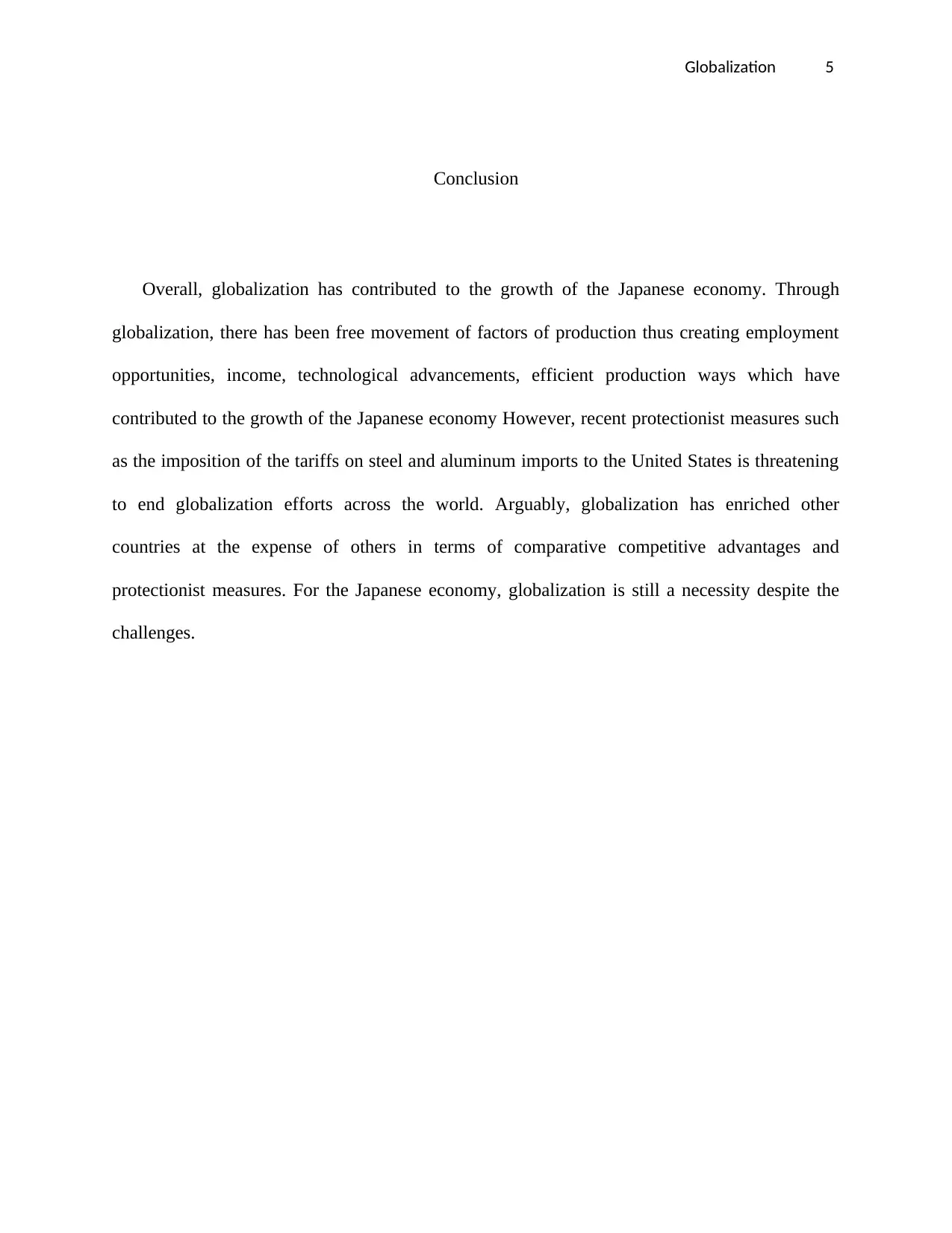
Globalization 5
Conclusion
Overall, globalization has contributed to the growth of the Japanese economy. Through
globalization, there has been free movement of factors of production thus creating employment
opportunities, income, technological advancements, efficient production ways which have
contributed to the growth of the Japanese economy However, recent protectionist measures such
as the imposition of the tariffs on steel and aluminum imports to the United States is threatening
to end globalization efforts across the world. Arguably, globalization has enriched other
countries at the expense of others in terms of comparative competitive advantages and
protectionist measures. For the Japanese economy, globalization is still a necessity despite the
challenges.
Conclusion
Overall, globalization has contributed to the growth of the Japanese economy. Through
globalization, there has been free movement of factors of production thus creating employment
opportunities, income, technological advancements, efficient production ways which have
contributed to the growth of the Japanese economy However, recent protectionist measures such
as the imposition of the tariffs on steel and aluminum imports to the United States is threatening
to end globalization efforts across the world. Arguably, globalization has enriched other
countries at the expense of others in terms of comparative competitive advantages and
protectionist measures. For the Japanese economy, globalization is still a necessity despite the
challenges.
⊘ This is a preview!⊘
Do you want full access?
Subscribe today to unlock all pages.

Trusted by 1+ million students worldwide
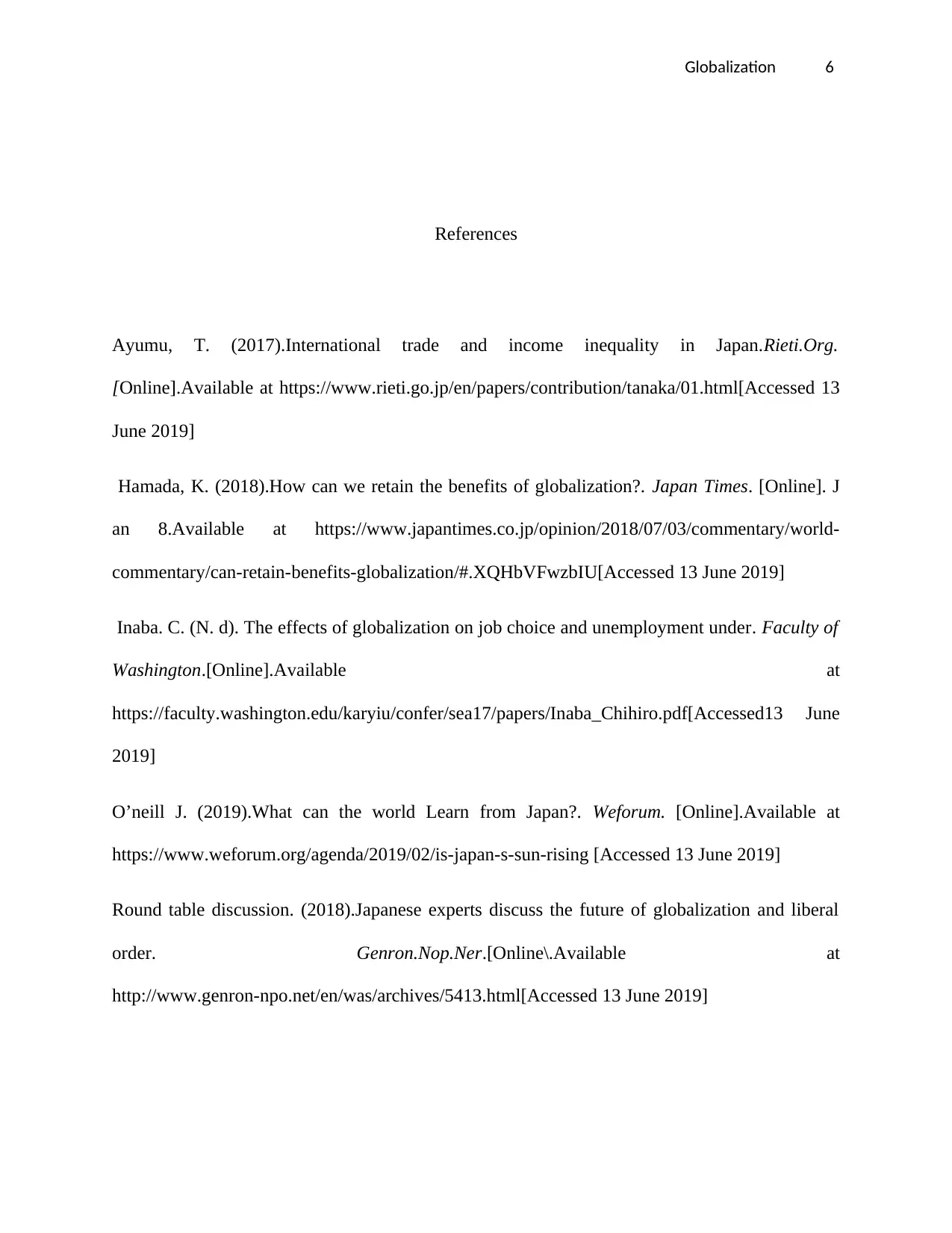
Globalization 6
References
Ayumu, T. (2017).International trade and income inequality in Japan.Rieti.Org.
[Online].Available at https://www.rieti.go.jp/en/papers/contribution/tanaka/01.html[Accessed 13
June 2019]
Hamada, K. (2018).How can we retain the benefits of globalization?. Japan Times. [Online]. J
an 8.Available at https://www.japantimes.co.jp/opinion/2018/07/03/commentary/world-
commentary/can-retain-benefits-globalization/#.XQHbVFwzbIU[Accessed 13 June 2019]
Inaba. C. (N. d). The effects of globalization on job choice and unemployment under. Faculty of
Washington.[Online].Available at
https://faculty.washington.edu/karyiu/confer/sea17/papers/Inaba_Chihiro.pdf[Accessed13 June
2019]
O’neill J. (2019).What can the world Learn from Japan?. Weforum. [Online].Available at
https://www.weforum.org/agenda/2019/02/is-japan-s-sun-rising [Accessed 13 June 2019]
Round table discussion. (2018).Japanese experts discuss the future of globalization and liberal
order. Genron.Nop.Ner.[Online\.Available at
http://www.genron-npo.net/en/was/archives/5413.html[Accessed 13 June 2019]
References
Ayumu, T. (2017).International trade and income inequality in Japan.Rieti.Org.
[Online].Available at https://www.rieti.go.jp/en/papers/contribution/tanaka/01.html[Accessed 13
June 2019]
Hamada, K. (2018).How can we retain the benefits of globalization?. Japan Times. [Online]. J
an 8.Available at https://www.japantimes.co.jp/opinion/2018/07/03/commentary/world-
commentary/can-retain-benefits-globalization/#.XQHbVFwzbIU[Accessed 13 June 2019]
Inaba. C. (N. d). The effects of globalization on job choice and unemployment under. Faculty of
Washington.[Online].Available at
https://faculty.washington.edu/karyiu/confer/sea17/papers/Inaba_Chihiro.pdf[Accessed13 June
2019]
O’neill J. (2019).What can the world Learn from Japan?. Weforum. [Online].Available at
https://www.weforum.org/agenda/2019/02/is-japan-s-sun-rising [Accessed 13 June 2019]
Round table discussion. (2018).Japanese experts discuss the future of globalization and liberal
order. Genron.Nop.Ner.[Online\.Available at
http://www.genron-npo.net/en/was/archives/5413.html[Accessed 13 June 2019]
Paraphrase This Document
Need a fresh take? Get an instant paraphrase of this document with our AI Paraphraser

Globalization 7
Weib, J Sachs A & Weinelt, H. (2018). 2018 Globalization Report. Bertelsmann-Stiftung.
[Online].Available at https://www.bertelsmann-stiftung.de/fileadmin/files/BSt/Publikationen/
GrauePublikationen/MT_Globalization_Report_2018.pdf[Acccessed 13 June 2019]
Weib, J Sachs A & Weinelt, H. (2018). 2018 Globalization Report. Bertelsmann-Stiftung.
[Online].Available at https://www.bertelsmann-stiftung.de/fileadmin/files/BSt/Publikationen/
GrauePublikationen/MT_Globalization_Report_2018.pdf[Acccessed 13 June 2019]
1 out of 8
Related Documents
Your All-in-One AI-Powered Toolkit for Academic Success.
+13062052269
info@desklib.com
Available 24*7 on WhatsApp / Email
![[object Object]](/_next/static/media/star-bottom.7253800d.svg)
Unlock your academic potential
Copyright © 2020–2026 A2Z Services. All Rights Reserved. Developed and managed by ZUCOL.




